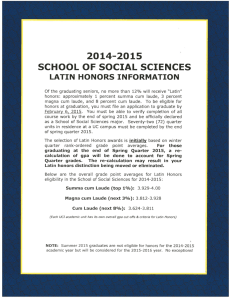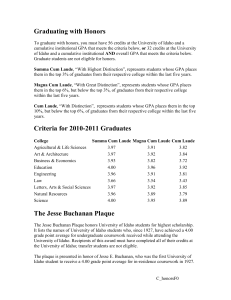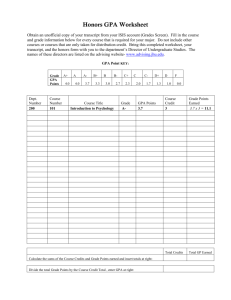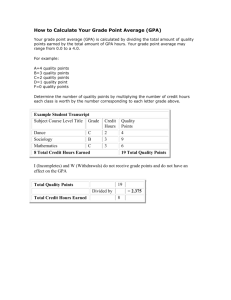COURSE REPEAT POLICIES AT OTHER INSTITUTIONS College of
advertisement
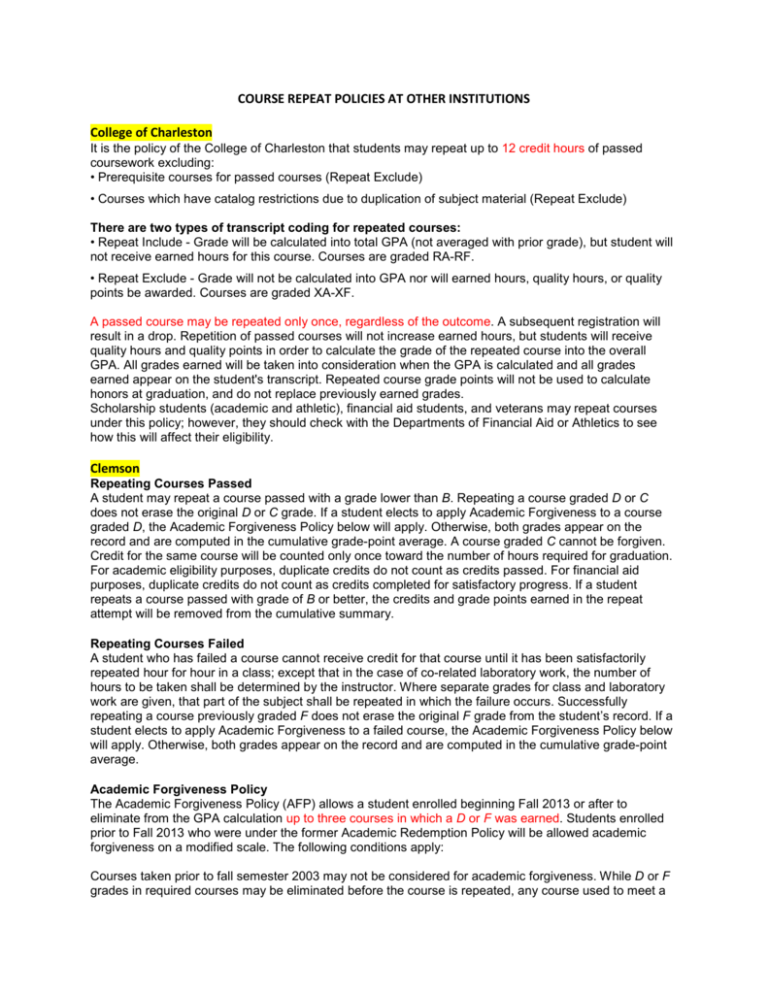
COURSE REPEAT POLICIES AT OTHER INSTITUTIONS College of Charleston It is the policy of the College of Charleston that students may repeat up to 12 credit hours of passed coursework excluding: • Prerequisite courses for passed courses (Repeat Exclude) • Courses which have catalog restrictions due to duplication of subject material (Repeat Exclude) There are two types of transcript coding for repeated courses: • Repeat Include - Grade will be calculated into total GPA (not averaged with prior grade), but student will not receive earned hours for this course. Courses are graded RA-RF. • Repeat Exclude - Grade will not be calculated into GPA nor will earned hours, quality hours, or quality points be awarded. Courses are graded XA-XF. A passed course may be repeated only once, regardless of the outcome. A subsequent registration will result in a drop. Repetition of passed courses will not increase earned hours, but students will receive quality hours and quality points in order to calculate the grade of the repeated course into the overall GPA. All grades earned will be taken into consideration when the GPA is calculated and all grades earned appear on the student's transcript. Repeated course grade points will not be used to calculate honors at graduation, and do not replace previously earned grades. Scholarship students (academic and athletic), financial aid students, and veterans may repeat courses under this policy; however, they should check with the Departments of Financial Aid or Athletics to see how this will affect their eligibility. Clemson Repeating Courses Passed A student may repeat a course passed with a grade lower than B. Repeating a course graded D or C does not erase the original D or C grade. If a student elects to apply Academic Forgiveness to a course graded D, the Academic Forgiveness Policy below will apply. Otherwise, both grades appear on the record and are computed in the cumulative grade-point average. A course graded C cannot be forgiven. Credit for the same course will be counted only once toward the number of hours required for graduation. For academic eligibility purposes, duplicate credits do not count as credits passed. For financial aid purposes, duplicate credits do not count as credits completed for satisfactory progress. If a student repeats a course passed with grade of B or better, the credits and grade points earned in the repeat attempt will be removed from the cumulative summary. Repeating Courses Failed A student who has failed a course cannot receive credit for that course until it has been satisfactorily repeated hour for hour in a class; except that in the case of co-related laboratory work, the number of hours to be taken shall be determined by the instructor. Where separate grades for class and laboratory work are given, that part of the subject shall be repeated in which the failure occurs. Successfully repeating a course previously graded F does not erase the original F grade from the student’s record. If a student elects to apply Academic Forgiveness to a failed course, the Academic Forgiveness Policy below will apply. Otherwise, both grades appear on the record and are computed in the cumulative grade-point average. Academic Forgiveness Policy The Academic Forgiveness Policy (AFP) allows a student enrolled beginning Fall 2013 or after to eliminate from the GPA calculation up to three courses in which a D or F was earned. Students enrolled prior to Fall 2013 who were under the former Academic Redemption Policy will be allowed academic forgiveness on a modified scale. The following conditions apply: Courses taken prior to fall semester 2003 may not be considered for academic forgiveness. While D or F grades in required courses may be eliminated before the course is repeated, any course used to meet a graduation requirement must be repeated satisfactorily at Clemson University. Both grades will remain on the transcript, degree progress report, and other official documents. For financial aid purposes, courses repeated under this policy resulting in duplicate credit do not count for satisfactory academic progress. The AFP shall apply only to courses taken at Clemson University. Course substitutions are not permitted. Students may not invoke the AFP after they have graduated. After graduation, students may repeat coursework, but both grades will be calculated in the grade-point average. The AFP may not be applied to a course taken on a Pass/No Pass basis or to any course in which the student was previously found in violation of the academic integrity policy. USC Course Grade Forgiveness It is the policy of the University of South Carolina that every currently enrolled, fully admitted, degreeseeking undergraduate earning a D+, D, F, or WF in a University course may take up to two undergraduate courses for a second time for the purpose of grade forgiveness. Both the first and second grades shall appear on the University permanent record, but only the second grade will be used in computing the University of South Carolina cumulative grade point average. An explanatory notice will appear on the record. Once grade forgiveness is applied to a repeated course, the action may not be revoked. This policy does not preclude students from repeating classes multiple times, in accordance with program requirements, but only the second attempt at the class may forgive the original grade of D+, D, F, or WF. Only a regular letter grade can replace a forgiven grade. Grades of W, I, S, U, or AUDIT may not replace previous grades. Grades carrying an honor code violation sanction of X are not eligible for grade forgiveness. Established requirements for repeating classes, admission to, or progression in, specific academic programs of the University take precedence over the grade forgiveness policy. Program or progression grade point averages are not affected by this policy. Refer to the guidelines for each program for specific requirements. Courses intended to be repeated for additional credit, such as research or applied music, are not eligible for grade forgiveness. Semester honors (dean’s or president’s honor list), academic standing (scholastic deficiency, probation, suspension), or previous grade point totals will not change retroactively as a result of applying this policy. UNCC Repeating Courses-With Grade Replacement Undergraduate students may replace up to two (2) courses (maximum of 8 credit hours) for grade replacement. Both grades will be reflected on the transcript. However, the higher of the two grades will be used in calculation of the GPA. This policy applies to courses first taken in Fall 2007 and thereafter. [Note: Some courses in the College of Health and Human Services may not allow grade replacement.] All courses for which a grade of A, B, C, D, or F may be assigned are eligible for grade replacement under this policy. The course to be replaced and the repeat course must have their grades assigned by UNC Charlotte. Students must submit a completed “Grade Replacement” online form through Banner Self-Service by the last day to Add/Drop a course with no record in the semester or summer session in which the course is to be repeated. A repeated course may not be selected retroactively to use this grade replacement policy. In courses for which the final grade assigned was a D or F, the student may submit the “Grade Replacement” online form requiring no further approval, providing it is within the course and hour limits specified in this policy. In courses for which the final grade assigned was a C or above, the student must submit the online form that will be routed electronically to obtain approval of the department chair and the dean of the college of the student’s program or major, and remain within the two-course, eight-hour limitations of this policy. Once a student has filed a “Grade Replacement” form for a course that choice cannot be revoked due to withdrawing from the course or from the University. (Medical or special circumstances may be reviewed on a case-by-case basis.) The original course grade will be the grade of record for the course and not a W. Any such withdrawal still consumes one of the two course substitutions permitted under this policy. Students enrolled in special topics courses for a grade received owing to an admitted or adjudicated academic dishonesty violation shall not be replaced if the course is repeated. This exception is not subject to appeal or academic petition. Repeating Courses-Without Grade Replacement In all courses which are not identified as being repeatable for additional credits, a student who has received a grade of C, H, P, or above in a course may repeat that course only with prior approval of the student’s advisor, department chair, and dean. An undergraduate student who received a D, F, or U in a course may repeat a course without seeking outside approval. All grades for repeated courses will be shown on the student’s official transcript and be used in the calculation of the grade point average. For prerequisite purposes, the most recent grade will be used whether or not it is the highest. Coastal Carolina University Repeat Forgiveness Option Degree-seeking undergraduate students may repeat any course taken at Coastal Carolina University. All grades will appear on the student’s transcript, but a course that has been repeated will be counted only once for the graduation requirement. For financial aid and scholarship purposes, duplicate credits do not count as credits completed for satisfactory academic progress except in certain cases. As specified in the University catalog, some courses, such as those requiring physical skills, performance, or working on student publications, may be repeated for credit and grades. All grades will be included when calculating the student’s grade point average with the following possible exception. Students may elect to exercise a “repeat forgiveness” option for up to 13 undergraduate credits during his/her enrollment at Coastal Carolina University for courses taken at Coastal Carolina University. For credits taken under this option, Coastal Carolina University will exclude the grade and credit hours earned for the first enrollment in the course when calculating the student’s cumulative GPA and earned credit hours. Both grades will appear on the transcript. Only course grades of C, D, D+, F, or WF are eligible for “repeat forgiveness.” A student may not exercise the “repeat forgiveness” option for courses in which the student was assigned a grade as a result of academic misconduct. Students selecting the “repeat forgiveness” option should be aware that professional schools, graduate programs, and future employers may apply his/her own criteria that may not recognize a “repeat forgiveness” option in evaluating credentials for prospective students and employees. Standard Repeat Outside of the “repeat forgiveness” option or once a student’s 13 undergraduate credits of “repeat forgiveness” have been exhausted, a student may repeat a course which has been passed in order to raise the grade only in the event that the degree college requires a higher grade in the course. A student who repeats the course will have both grades entered on the permanent academic record and computed into the grade point average. FURMAN (no “repeat exemptions” or “academic forgiveness”) Repeating Courses Degree-seeking students at Furman may not repeat for credit a course for which a passing grade has previously been awarded at Furman. A student may repeat a failed course, in which case both the failing (F) grade and the subsequent passing grade will appear on the academic record and be calculated in the grade point average. James Madison University Repeating Courses A student may repeat any of the graded courses that he/she has taken during an undergraduate career at JMU. All grades will be included when calculating the student’s grade point average. There are, however, certain exceptions to this rule. Students may elect to repeat up to two courses during their enrollment in an undergraduate career at JMU on a “repeat forgiveness” basis. As a result of the “repeat forgiveness” option, the university will exclude the previous grade and credit hours earned for the repeated course when it calculates the student’s cumulative GPA and earned credit hours total, regardless of whether the previous grade was higher or lower than the repeat attempt. Both grades will appear on the transcript, and the recalculation of the cumulative GPA will occur after the repeat/forgiveness attempt. The student must either declare the “repeat forgiveness” option at registration or complete the appropriate adjustment form prior to the end of the course adjustment period. A student may not exercise the repeat/forgiveness option for courses in which that student was assigned a grade as a result of an Honor Code violation. Courses taught on a topic basis are repeatable; however, these courses may only be designated with a repeat credit or repeat/forgiveness credit option if both course attempts have the same topic (i.e. a second attempt of the course GHUM 200. Western Classics may only be assigned as a repeat credit or repeat/forgiveness credit if the original attempt of GHUM 200 was taken with the topic “Western Classics”).All grades will appear on the student’s transcript, but a course that has been repeated will only be counted once toward satisfying graduation requirements. Courses taken at other institutions do not qualify to be taken as “repeat forgiveness.” Courses taken in a different JMU career (i.e. Continuing Education) and subsequently transferred to an undergraduate JMU career are not repeatable. Students may request approval to retake these courses utilizing the audit grading basis only. Appalachian State University (No “repeat exemptions” or “academic forgiveness”) Repeating a Course Unless otherwise noted in the course description, credit hours earned in a particular course will not be awarded more than one time; i.e., if a course in which credit hours have been earned is repeated with a passing grade, additional credit hours will not be awarded. If, however, a course in which credit hours have been previously earned is repeated and the student earns a grade of “F”, “U”, or “WF” in the subsequent taking of the course, the hours earned initially will be subtracted from the student's total. In either of these cases, the most recent grade earned becomes the official grade for the course. Courses that match in number and title may not be repeated for duplicate credit unless the department chair of the course notifies the Registrar's Office that the course content has changed substantially. Students who have earned credit for any course taken at Appalachian State University may not then transfer credit to Appalachian State University for the same course taken at another institution at a later date. Winthrop A student may repeat any course taken at Winthrop University or transferred to Winthrop for which he or she did not earn a grade of B or higher, or a grade of S. (This regulation does not apply to courses that may be repeated for additional credit.) Credit hours earned in a particular course taken at Winthrop will not be awarded more than one time (unless the course has been approved for additional credit), and transfer credit for repeated courses will be forfeited. A student who enters Winthrop as a freshman is allowed a maximum of four repeated courses with grade exemption for any courses taken at Winthrop University for which he or she did not earn a grade of B or higher. Under this policy, the original grade earned in the course will be exempted from the calculation of the cumulative grade point average. Students who transfer to Winthrop with fewer than 40 semester hours of credit also are allowed the four course repeats with grade exemption; those with at least 40 and fewer than 70 hours are allowed three; those with at least 70 and fewer than 100 are allowed two; and those with 100 or more allowed only one repeated course for which the original grade may be exempted from the cumulative grade point average. The repeat exemptions will be automatically applied to courses as they are repeated up to the allowed number of repeat exemptions. Receiving a grade of U in a repeated course will not replace a previous attempt’s grade, but will utilize one of the repeat exemptions. Please note that repeat exemptions only apply to courses taken and retaken at Winthrop. USC Graduation with Honors at Other Universities Graduation with honors will be based on a cumulative GPA calculated on the basis of all work for college credit, including any attempted at other institutions at any time. This calculation will include all courses attempted, not just those submitted in fulfillment of graduation requirements. Honors designators are determined at the time of graduation and may not be applied retroactively. In addition, students with overall honors must show a GPA at USC which meets the level specified for the honors being sought. The following designations indicate a consistently high level of academic achievement throughout the student’s entire academic career. To graduate with such honors, a student must have earned at least 60 credit hours applicable toward the degree in residence at the University, 30 credit hours for an associate degree. Courses taken by a transient student at other institutions, by correspondence, by examination, or by exemption are not considered “in residence.” Summa Cum Laude: a cumulative GPA of 3.95-4.00; Magna Cum Laude: a cumulative GPA of 3.753.949; Cum Laude: a cumulative GPA of 3.50-3.749 Clemson Merely states cumulative gpa must be Cum Laude—3.40, Magna Cum Laude—3.70, and Summa Cum Laude—3.90. James Madison University To be considered for graduation honors, you need at least four regular semesters at JMU, 60 earned credit hours at JMU, and a minimum grade point average of 3.50 at JMU. If you meet these criteria, then grades from all college work (including work taken at other institutions) will be combined with your JMU course work to determine the graduation grade point average and honors category. Coastal Carolina University Eligibility for Graduation with Honors is based on the student’s cumulative grade point average of all coursework taken at Coastal Carolina University (which includes both original and repeated grades that were taken under the University’s Course Repeat Forgiveness Option). To graduate with such honors, a student must have earned at least 60 graded credit hours (which can include credits earned through officially recognized Coastal Carolina University academic exchange programs) applicable toward the degree "in residence" at Coastal. Courses taken at other institutions, by correspondence, by examination, by exemption, or credits earned through military credentials are not considered in the calculation for graded hours. Summa cum Laude: a cumulative GPA of 4.0, Magna cum Laude: a cumulative GPA of 3.75 - 3.99, Cum Laude: a cumulative GPA of 3.5 - 3.74 Appalachian State University To be eligible for graduation with honors, an undergraduate student must complete, in residence at Appalachian, a minimum of either four semesters in full-time attendance (defined as twelve or more credit hours per semester), or a total of 58 semester hours. (Note: Credit for which a grade is not awarded will not be used in the determination of honors—e.g., APP, CLEP, credit by examination, credit for military service, credit for prior learning, etc.) A minimum grade-point average of 3.45 is required for College of Charleston To be eligible for graduation with honors, at least 62 quality hours of the coursework to be applied to the degree must have been completed at the College of Charleston. All coursework taken at the College of Charleston will be included in the calculation of the GPA for graduation with honors. 3.900 to 4.000 Summa cum laude, 3.750 to 3.899 Magna cum laude, 3.500 to 3.749 Cum laude FURMAN Students who have earned at least 64 credits at Furman are eligible for graduation honors. Students earning a grade point average of at least 3.90 in all Furman course work are designated as summa cum laude graduates. Students earning a grade point average of at least 3.65, but less than 3.90 will be magna cum laude graduates and students earning a grade point average of at least 3.40, but less than 3.65 are considered cum laude graduates. UNCC Graduation with Distinction Students may earn undergraduate degrees at different levels of distinction: Cum Laude (3.4 or more but less than 3.70, Magna Cum Laude (3.7 but less than 3.9) and Summa Cum Laude (3.9 to 4.0). To be eligible to graduate with distinction, a student must have a grade point average computed on at least 48 semester hours of credit completed in residence at UNC Charlotte. WINTHROP Any undergraduate student who completes degree requirements with a final grade-point average of 3.50 to 3.74 shall be granted a diploma cum laude; any undergraduate student who completes degree requirements with a final grade-point average of 3.75 to 3.89 shall be granted a diploma magna cum laude; any undergraduate student who completes degree requirements with a final grade-point average of 3.90 or higher shall be granted a diploma summa cum laude. In order for a student who has credits transferred from another institution to receive a diploma with honors (cum laude, magna cum laude, summa cum laude), it is necessary for the student to have both of the following: • • The required grade-point average for all work taken at Winthrop The required grade-point average on the combination of: Winthrop work (including courses lost due to utilization of academic forgiveness) AND All work taken at other institutions. Note: Coursework taken at other institutions cannot raise a graduate to a higher level of Academic Honors. Students who transfer to Winthrop must have the required GPA on all course work taken, including courses taken at other institutions, to qualify for graduation with honors. Honors Recognition Any undergraduate student who completes degree requirements with a final grade point average of 3.75 and earned a minimum of 48 quality hours (earned hours on a regular letter grade basis) at Winthrop University will receive Honors Recognition.
